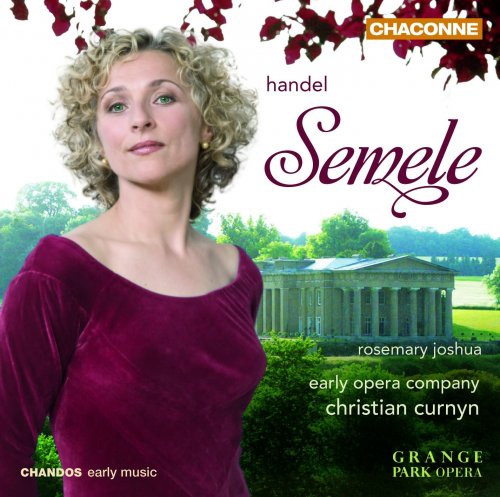
Rosemary Joshua, Early Opera Company, Christian Curnyn - Handel: Semele (2007)
BAND/ARTIST: Rosemary Joshua, Early Opera Company, Christian Curnyn
- Title: Handel: Semele
- Year Of Release: 2007
- Label: Chandos
- Genre: Classical
- Quality: FLAC (image + .cue, log, artwork)
- Total Time: 02:49:00
- Total Size: 834 MB
- WebSite: Album Preview
Performed “in the manner of an oratorio” (this was Lent 1744), Handel’s tragi-comedy of lust and ambition was far too depraved for contemporaries like Charles Jennens, who contemptuously dismissed it as “a baudy opera”. (A friend countered by dubbing it a “Bawdatorio”.) Today, of course, Semele is, with Giulio Cesare – another uninhibited celebration of the power of sex – the Handel work most likely to fill an opera house. Of a handful of previous recordings, none was entirely satisfying, though Gardiner’s 1981 Erato set might have been if had not cut around 40 minutes of music. Which makes this new version – complete save for an aria for Cupid that Handel later pilfered for Hercules – all the more welcome.
Christian Curnyn understands the unique tinta of this gorgeous score, and directs his spruce period band with a nice blend of nonchalant elegance and dramatic energy. Tempi are shrewdly judged, rhythms light and supple, and recitatives tumble inevitably into arias. The tragic denouement in Act 3 has due weight and intensity, whether in the tenderly inflected accompanied recitatives for Jupiter and Semele, or the awed chorus of Thebans after the heroine’s incineration. As at the English National Opera, Rosemary Joshua, radiant of tone, dazzling in coloratura, makes Semele far more than an over-sexed airhead. She is trills ethereally in “The morning lark”, distils a drowsy, erotic languor in “O†sleep, why dost thou leave me?”, and ornaments her “mirror” aria, “Myself I shall adore”, with dizzy glee. She is imploring and fiery by turns in her exchanges with Jupiter, and brings real pathos to the haunting siciliano “Thus let my thanks be paid” and her sublime death scene. As Jupiter, Richard Croft fields a honeyed, sensuous tone (heard to advantage in a seductive “Where’re you walk”) and formidable agility, though he could learn a thing or two about diction from Gardiner’s Anthony Rolfe-Johnson.
Like Handel himself, Curnyn assigns the virago Juno and Semele’s gentle sister Ino to the same singer. Hilary Summers, a true, deep contralto, characterises both roles well, though in sheer bitchiness her Juno yields to Della Jones (Gardiner) and Marilyn Horne, on the variably cast DG recording conducted by John Nelson (where Kathleen Battle’s ultra-knowing, heavy-lidded Semele may be more to your taste than mine). Brindley Sherratt, with his oaky bass, offers vivid, witty cameos as Cadmus and Somnus, while Stephen Wallace sings Athamas’s arias with smooth tone and a nimble florid technique, though a suspicion remains that the role lies a bit low for him. With excellent recorded sound and balance, and an informative essay from David Vickers, this becomes a clear first choice for an ever-enticing work. -- Richard Wigmore, Gramophone [1/2008]
Christian Curnyn understands the unique tinta of this gorgeous score, and directs his spruce period band with a nice blend of nonchalant elegance and dramatic energy. Tempi are shrewdly judged, rhythms light and supple, and recitatives tumble inevitably into arias. The tragic denouement in Act 3 has due weight and intensity, whether in the tenderly inflected accompanied recitatives for Jupiter and Semele, or the awed chorus of Thebans after the heroine’s incineration. As at the English National Opera, Rosemary Joshua, radiant of tone, dazzling in coloratura, makes Semele far more than an over-sexed airhead. She is trills ethereally in “The morning lark”, distils a drowsy, erotic languor in “O†sleep, why dost thou leave me?”, and ornaments her “mirror” aria, “Myself I shall adore”, with dizzy glee. She is imploring and fiery by turns in her exchanges with Jupiter, and brings real pathos to the haunting siciliano “Thus let my thanks be paid” and her sublime death scene. As Jupiter, Richard Croft fields a honeyed, sensuous tone (heard to advantage in a seductive “Where’re you walk”) and formidable agility, though he could learn a thing or two about diction from Gardiner’s Anthony Rolfe-Johnson.
Like Handel himself, Curnyn assigns the virago Juno and Semele’s gentle sister Ino to the same singer. Hilary Summers, a true, deep contralto, characterises both roles well, though in sheer bitchiness her Juno yields to Della Jones (Gardiner) and Marilyn Horne, on the variably cast DG recording conducted by John Nelson (where Kathleen Battle’s ultra-knowing, heavy-lidded Semele may be more to your taste than mine). Brindley Sherratt, with his oaky bass, offers vivid, witty cameos as Cadmus and Somnus, while Stephen Wallace sings Athamas’s arias with smooth tone and a nimble florid technique, though a suspicion remains that the role lies a bit low for him. With excellent recorded sound and balance, and an informative essay from David Vickers, this becomes a clear first choice for an ever-enticing work. -- Richard Wigmore, Gramophone [1/2008]
Classical | FLAC / APE | CD-Rip
As a ISRA.CLOUD's PREMIUM member you will have the following benefits:
- Unlimited high speed downloads
- Download directly without waiting time
- Unlimited parallel downloads
- Support for download accelerators
- No advertising
- Resume broken downloads


